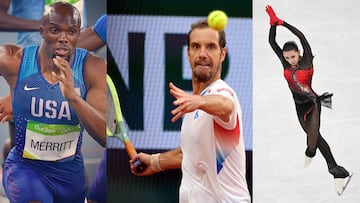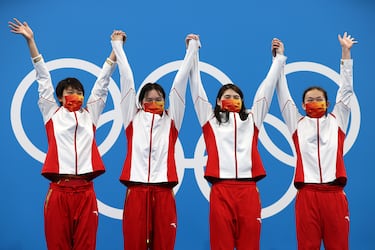Kisses, cocaine candies or oral sex: What were the most surreal defenses on doping?
Asinga’s case, which places the origin of his positive result in contaminated sweets, joins many others. Gasquet, Valieva, Simoni...

Issamade Asinga, the under-20 world record holder in the 100-meter dash (9.89 seconds) and considered by many to be Bolt’s successor, was sanctioned for doping this Tuesday. The 19-year-old Surinamese athlete tested positive for GW1516, a substance also known as Cardarine and included in the list of prohibited products of the World Anti-Doping Agency (WADA). As a result, he will be banned from competing for four years. In his defense, the athlete claimed to have consumed some contaminated candy. “Unfortunately, in 2023, PepsiCo gave me a Gatorade gift package that contained Gatorade Recovery Gummies. A WADA-accredited laboratory identified that the containers of the product they gave me were contaminated with GW1516,” he said. His unusual defense adds to the many others in the world of sports, some successful and others not so much.
Gasquet and a cocaine kiss
In 2009, during the Miami Masters 1,000, the French tennis player Richard Gasquet, who is still active at 37 years old, tested positive for cocaine. Despite this, he did not face any sanctions, which could have resulted in a two-year suspension. Gasquet defended himself by claiming that the substance had entered his body after he kissed a woman named Pamela, whom he claimed to know only by name and as a regular drug user. According to their explanations, which were accepted, this incident occurred the night before the drug test at a party in a club in Miami.
Cocaine again... in some candies
In 2002, Gilberto Simoni, a two-time winner of the Giro d’Italia, tested positive for cocaine. Despite avoiding punishment, he withdrew from the Italian round of that year. He claimed that the cocaine came from candies his aunt, Jacinta, had given him to soothe his sore throat, which were originally from Peru.

Contaminated food
In April, the documentary “Doping Top Secret: China Files” brought attention back to the case of 23 Chinese swimmers testing positive for the banned substance trimetazidine in 2021. WADA did not issue provisional suspensions or conduct its investigation. According to the report from the Chinese anti-doping agency (CHINADA), the positive results were attributed to the food consumed by the athletes at the Huayang Holiday Hotel in Shijiazhuang. The report stated that traces of the substance were found in spice jars, the extractor, and a drain.
Grandpa's medication
In another recent case closely related to the previous one, during the 2022 Winter Olympic Games in Beijing, Kamila Valieva tested positive for trimetazidine. The 15-year-old Russian skater, who became the first woman capable of performing a quadruple jump in the Games, claimed that the substance was found in her grandfather’s medication. Despite her defense, the athlete’s four-year sanction was confirmed this year.
Oral sex
In 1996, Daniel Plaza, the champion of the 20-kilometer walk race at the Barcelona 1992 Olympic Games, tested positive for nandrolone, an anabolic steroid with properties similar to testosterone. The Spanish athlete, who was suspended for two years, claimed that the substance entered his body after he had performed oral sex on his pregnant wife. Nine years later, the Supreme Court ruled in favor of the racewalker due to a procedural error.

Too much love
Once again, sex has been linked to wrongdoing. In 1998, sprinter Dennis Mitchell, who had won two world gold medals, tested positive for testosterone. He claimed that the high levels were due to drinking beer and engaging in intense lovemaking. Although the American Federation cleared him of wrongdoing, the International Federation later intervened and imposed a two-year suspension.
A penis enlargement
Related stories
In 2010, LaShawn Merritt, an Olympic and world 400-meter champion, tested positive for DHEA and pregnenolone. He claimed that these substances were in a product called ExtenZe, which he was taking to increase the size of his penis. Merritt expressed deep shame and humiliation for his actions and received a 21-month sanction, which was later reduced. Despite this, he was able to defend his world title in Daegu in 2011.
Rain with EPO
After testing positive for EPO in 2012 following the Perpignan marathon, Fatima Yvelain, a French runner who participated in the Sydney 2000 Olympics, claimed that the substance had entered her urine sample due to rain. She stated, “It had rained heavily during the race. I’m not certain how, but the rain must have carried some doping substance that got into my sneakers and shorts. During the anti-doping test, the rainwater contaminated the urine sample taken after the race,” as her explanation.

